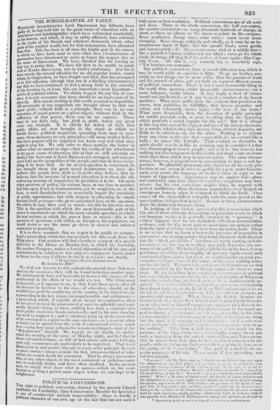TIM SCHOOLMASTER AT FAULT.
IVuirsvss inconsistencies Lord BROUGHAM has hitherto been ray of, be has held fast, to the great cause of education with an earnestness and indefatigability which have redounded wonderfully to his honour, and which, it may be safely affirmed, have retained jI3 the ranks of his friends and admirers thousands whom other parts of his c,o.nduct would, but for that redemption, have alienated from him. 'l 'his has been in all time the bright spot in his career, to which we have been used to turn when new circumstances of provocation have threatened to make us forget the respect due to the name of BROUGHAM. WC have thanked him for leaving us that way to praise him. We have felt that to be unable to speak well ell of Muter RsouonAm, was in itself a misfortune. Nor has it been merely the natural affliction for an old popular leader, under whom, in imagination, we have fought and bled, that has prompted us to this adhesion, (though that too is a binding. circumstance) but that we have continued to feel a strong flail in the sincerity of his devotion to' at least, this one important—most important— To obtain respect for any line of con-
article of political reform.
duct, it is only necessary that there should be an impression Of its sincerity. Men resent nothing in this world so much as imposition. All movements of any magnitude arc brought about by that one agent—frith : without &Rh in a principle, there can be no con- centration of moral power on a given object ; without faith in the sufficiency of that power, there can be no success. There must be not faith only, but faith in faith, before any great cause can triumph. It is chiefly for defect of filth that public aflimirs are now brought to the stand at which we behold them; political scepticism spreading from men to mea- sures—from measures to very principles—tillmany neither believe that their prayers will be regarded nor know very well what they ought to pray for. We only refer to these matters the better to enforce what we meant to urge—that the reality of his attachment to the great cause of' education, (for of that we still entertain no doubt,) has been and is Lord Ilaouenaat's strongest, and only ge- veral hold on the sympathies of' the people, and that Inc loses every- thing if he loses that. As far as that question is concerned, Inc has brought' about the great moral desideratum we have de- scribed—the people have faith in his faith; they believe, that Inc believes, that the measure of general education is to them the all- embracing measure of importance he proclaims it to be. On most other questions of policy, his actions have, at one time or another, laid him open, if not to condemnation, yet to suspicion, or, at the least, to such dissatisfactions as necessarily impair the unanimity of public approbation ; but with respect to education, he stands forward facile iwineeps—the great undoubted hero of' the question. On others he may have said as much—for this Inc has done most. This is the question with which the most honourable part of his career is associated—to which his most valuable speeches, to which his best actions, to which his purest fame is sacred : this is tin' question of questions' with which, as friends to his reputation, we would desire to see his name go down in closest and strictest connexion to posterity. It is on these accounts that we regret to be unable to compre- hend a proceeding which has drawn much wit this week from the Whig press. Our readers will find elsewhere a report of a speech delivered in the House on Monday last, in which his Lordship, like another Prospero, makes a formal abjuration of all his arts and enchantments in relation to this subject ; engages to knock under in future to the very Calibans he lately so teased ; and, finally., )eeiser tbstn did ever plimonet sound
lie drowns his Bill!"
We shall not transtimr to this column time crystal tears that were shied on the occasion ; they will be found bedewing another page. We unfortunately have not been able to discover the sources of the sentimental in the affair, or we would cry too. The thing most lachryinable, as it appears to us, is that Lord !lam:Guam, after all the honours Inc has won in the cause of education, should, at the twelfth hour, peril the confidence or the country in his intoitions, by a proceeding in the last degree incomprehensible and ambiguous,— a proceeding which, it' capable of no better an explanation than be has given it, must be pronounced at once inexplicable ; and emi- nently absurd—being, in slot at, nothing less than a surrender or a great public cause into hands notocioMmly, and by his own showing, too weak to support it ; and a voluntary tying up at the same time of his own hands in regard to the same measure—at a moment when no hand can be spared front the work of educational retiom, much less—seeing how many refractories remaiu unwhipped—that of the "Schoolmaster" himself We repeat, we are unable to under- stand the meaning of the scene or Mondas, night, and feel that in these evil-minded times, so full of bad omens and worse bodings, such ugly occurrences are particularly to be regretted. That Lord BROLGIIAM is, and would—though to every otl'ier principle he were to prove untrue—always remain the fast, strenuous friend of edu- cation, we cannot doubt for a moment. That he always prosecutes this, or any other object, in the most consistent or kidicions man- ner, we certainly doubt, and have often doubted. In the present case, we simply don't know tehat he means,—which we the more
lament as so long a period must elapse before we can hope to be enlightened.


























 Previous page
Previous page